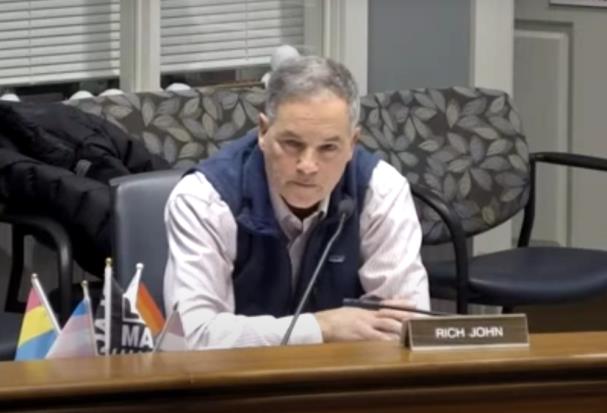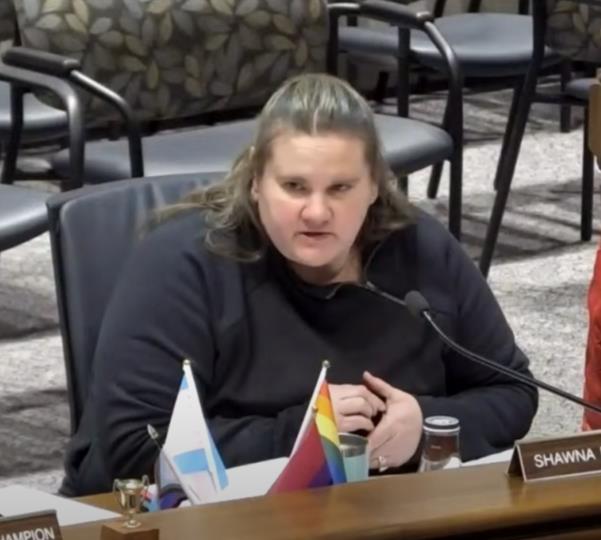Tompkins Legislature urges TCIDA expansion
by Robert Lynch; February 22, 2025
The Ithaca Board of Education wants its voice to be heard. So does the Town of Enfield. But first, New York lawmakers must grant their consent. And this week the Tompkins County Legislature took a needed step toward making that happen.

By its unanimous vote February 18th—Ulysses’ Anne Koreman was excused, but had previously stated her support—the Tompkins County Legislature endorsed and forwarded to our state Senator and Assemblymember a request for so-called “Home Rule” legislation that would expand membership in the Tompkins County Industrial Development Agency (IDA). It would raise membership from seven people to nine.
More than just adding chairs around the table, the enlargement is seen by some as a tool to infuse wider community input into the agency’s decisions, particularly those involving tax abatements granted for housing developments and solar farms.
“This is diversity. This is inclusion. This is giving many voices a chance to be heard,” this writer, Enfield Councilperson Robert Lynch, addressed the issue at the meeting’s start. The Enfield Town Board had adopted its own resolution in January calling for local and state lawmakers to expand the IDA by the two extra seats. The Enfield resolution would have governmental leaders assign one of those two positions to someone who would represent rural towns and villages.
The IDA board has long remained at seven members. And it will take an act of the New York State Legislature to change that. The current expansion initiative began last November when the Ithaca Board of Education recommended legislators take steps to grant it—or some other Tompkins County school district—a single seat at the table. Momentum behind the expansion has grown ever since.
When the current expansion plan cleared a County Legislature committee February 5th, at least one legislator, Ithaca’s Rich John, who doubles as the IDA current Chair, expressed misgivings. He feared that a school district representative would become a roadblock, a person repeatedly vetoing otherwise-worthy IDA initiatives. John repeated his concerns to the full Legislature this past Tuesday, yet added his affirmative vote, nevertheless.
“I’m willing to vote for this resolution,” John assured legislators, “but I do have real concerns.” Emails he’d received in the resolution’s support had alleged “the IDA has undermined the schools,” John reported.

“It’s just absolutely untrue,” the Ithaca Democrat said of the critical assertion. “Pardon me, I don’t want to get hyper-political here, but it’s like listening to our president talk about tariffs and who pays for them. People say things that are just not true,” John stated.
Later, a fellow Democrat, Veronica Pillar, tempered Rich John’s assertion with a healthy dose of doubt.
“Someone said it’s not true that the IDA has harmed the school districts,” Pillar remarked, explicitly declining to attribute the refutation to her colleague one seat away. “I think none of us here probably know. It’s not our place to say. And this is why it would be great to have more diverse voices at the table.”
What emerged from committee and secured legislative support that night looked a bit different from what the Ithaca Schools or the Town of Enfield had first recommended. The County Legislature’s proposal intentionally avoids creating specific new seats that clearly-defined constituencies would subsequently fill. Instead, the adopted resolution envisions expanding the IDA board’s number by adding two more “at-large” seats, raising at-large membership from its current four persons to as many as six.
As far as recruiting those half-dozen at-large members, the resolution’s text opts for ambiguity, stating only:
“That the appointing body of the TCIDA shall seek to fill at-large seats with a diverse representative board including the following representatives from as many of the following as possible, both urban and rural areas of the County, a member from the Ithaca Area Economic Development Board of Directors… municipal taxing jurisdictions, school districts, organized labor, finance & banking, development & construction and economic development appointed in a manner consistent with New York State law and local practices.”

School district hardliners may find the new textual vagueness hard to swallow. They may need to assure themselves of guaranteed input whenever tax abatements get decided. As for Enfield, this writer/ Councilperson accepted the new language as a fair compromise. For one thing, by stating particular interest group appointment as an aspirational goal rather than making it a promise, one evades the thorny problem of multiple governing jurisdictions squabbling among themselves as to whom to designate for an assigned seat.
As presently comprised, the IDA Board of Directors draws three of its members—one short of a majority—from the County Legislature itself. The Ithaca Area Economic Development Board, a corporate appendage of the IDA, appoints a fourth member.
The City of Ithaca, by recent practice, has landed the fifth seat, although it’s technically only an “at-large” appointment. Under pressure from worker interests back in 2021, the County Legislature has ever since then reserved one position on the IDA Board of Directors for a representative of organized labor.
Before the County Legislature took its vote February 18, Lansing lawmaker Mike Sigler sought assurance that the proposed restructuring would not jeopardize labor’s guaranteed presence.
Last October, the Tompkins County IDA granted its largest tax abatement ever, a 20-year, $85 Million relief package, to Ithaca’s SouthWorks development, an ambitious private initiative to transform the abandoned Morse Chain/Emerson Power factory on South Hill into housing, commercial, industrial and retail space. Credit the SouthWorks abatement controversy for driving the Ithaca Board of Education and its unionized teachers toward requesting school-centric IDA membership.

Rich John staunchly disagrees with his naysayers. But school officials and union leaders view the massive SouthWorks abatement as sucking money out of the tax base rather than contributing money to it. The critics’ schoolhouse math only works if one assumes SouthWorks—and lesser projects like it—would still happen were the abatements not to exist.
The Ithaca Teachers Association publicly opposed the SouthWorks abatement last October. Both Ithaca School Board member Jill Tripp and Ithaca Teachers Association President Katheryn Cernera spoke in favor of IDA expansion when the enabling resolution cleared a legislative committee earlier this month.
“The recent consideration of the SouthWorks industrial project, the decision to approve the project despite strong concerns about the impact of this project on the Ithaca City School District, and the defense of this decision… all prove that continuing to approve school tax abatements for industrial development projects without input from our local schools is a tremendous mistake,” Cernera told the Housing and Economic Development Committee.
County political leaders are listening. “I think one thing that I’ve heard very loud and clear in meeting with the teachers’ unions, in meeting with school board members, in meeting with constituents, was that there’s definitely a demand for more voices to be heard on the IDA,” legislator Shawna Black asserted in defense of Board expansion the night the legislature met.
But Rich John defends the IDA. He says the agency, since its birth decades ago, has pumped forth enough prosperity to produce $71 Million annually in local tax revenues.
“The IDA in Tompkins County has been remarkably successful in building tax base, in creating jobs, in furthering energy efficiency, in furthering affordable housing,” John counseled the Legislature.
IDA’s critics, John asserted, “seem to believe that we are giving money away to developers. We don’t do that. We do not abate existing taxes. The abatement only applies to new value, the bricks and mortar that are added,” he said. “That abatement phases out over time, and then they pay full taxes just like any other property owner.”
But 20 years for SouthWorks—or 30 years for Enfield’s Norbut Solar Farm—is a long, long wait. And local taxpayers, along with those who represent them, can be of the impatient type.
“I can tell you as far as Enfield is concerned, we would not be an automatic ‘no,’” this Councilperson assured Tompkins County’s legislators, while also acknowledging that municipalities and school districts, “shut out of the process” often have had to “compromise with our revenues” when tax abatements get struck.
“We would have an open mind and look at these matters and decide whether it’s in the best public interest overall in Tompkins County,” this writer assured lawmakers.

Rich John will be leaving the Tompkins County Legislature at year’s end. So will Mike Lane, the Legislature’s longest-tenured member. He’s also a former IDA chair.
“I would just remind everybody that this is an Industrial Development Agency,” Lane counseled. “And where we’ve gone astray is because we have become mostly a housing development organization,” he said. “We don’t need any more big box apartment complexes downtown that are having a hard time renting out.”
Mike Lane, quite transparently, referenced Library Place, the tax abated, Travis-Hyde developed senior housing project at Ithaca’s Court and Cayuga Streets. Developers tore down the Old County Library, got a tax abatement, built the apartment house despite protracted delays, and recently had to restructure their bargain, in part, by letting younger tenants live there.
“We need more light industry, the kind that we used to put up at the airport,” Lane reasoned. And why should we reshape priorities? Lane says it’s because new industry is going to Cortland and Cayuga and Tioga Counties instead.
****
It’s a truism: Big box housing gets pricey, yet creates few, if any permanent jobs. Factories employ people. There’s a big difference there. And many long-term residents, like Mike Lane (and also this writer) remember when IDA abatements helped build places like Borg Warner in Lansing. Now they underwrite high-end, high-rise housing that’s here, there… and seemingly everywhere. Set that issue aside as another challenge for another day.
But the Tompkins County Legislature has acted. Those who represent us in Albany will be asked to pass the Home Rule legislation that would expand the Tompkins County Industrial Development Agency. Bills like this often wait until the bitter end. Expect legislative action sometime in May or maybe early-June. Governor Hochul could wait until year’s end to give her signature. In the meantime, we wait.
###

